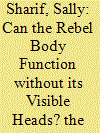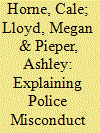| Srl | Item |
| 1 |
ID:
190150


|
|
|
|
|
| Summary/Abstract |
Mid-level commanders are commonly considered the visible heads of the rebel body: as leaders of combat operations, they are often targeted in counterterrorism or counterinsurgency operations. While their role during conflict has been theorized extensively, only recent scholarship has focused on mid-level commanders in post-conflict transitions. Specifically, it is not clear how mid-level commanders function within ex-combatant groups to create divergent peacebuilding results. This paper argues that transitions from conflict involve fraying of wartime bonds and rebel command-and-control structures, which is counterproductive to peace when rebels demobilize collectively. In peacetime and in the absence of wartime command, social groups formed through military logic struggle to redefine individual roles. Mid-level commanders, responsible for shaping intergroup bonds during conflict, are essential for allocating ex-combatant roles and redefining rebel-civilian relations. Against the common practice of breaking rebel wartime command-and-control structure during demobilization, this paper argues that ex-combatant groups can demobilize and reintegrate more successfully if they maintain their wartime cohesion and are provided the necessary tools for building sustainable livelihoods. To support the argument, the paper provides original qualitative and quantitative evidence from the Disarmament, Demobilization, and Reintegration (DDR) programme with the Revolutionary Armed Forces of Colombia (FARC).
|
|
|
|
|
|
|
|
|
|
|
|
|
|
|
|
| 2 |
ID:
190151


|
|
|
|
|
| Summary/Abstract |
Several recent studies consider the determinants of misconduct by military personnel deployed to United Nations peacekeeping operations (PKOs). While the majority of peacekeepers carry out their duties honorably and often at great personal risk, these studies operate from the premise that misconduct by even a few peacekeepers can undermine a mission, and reduce support for future missions. Even so, misconduct by civilian police deployed to PKOs remains massively understudied in comparison to their military counterparts, though UN police are more likely to face credible allegations of misconduct compared to UN troops. Based on the inclusive or extractive incentives of contributor states, we find support for the argument that the behavior of security personnel at home readily predicts misconduct when deployed to PKOs. This same logic has implications for the UN's increasingly preferred ‘Formed Police Units,’ whose use may actually increase the likelihood of sexual exploitation and abuse.
|
|
|
|
|
|
|
|
|
|
|
|
|
|
|
|
| 3 |
ID:
190152


|
|
|
|
|
| Summary/Abstract |
This research note extends the Bara and Hultman (2020) study on the effectiveness of non-UN peacekeeping missions in terms of curbing one-sided violence (OSV) against civilians. In particular, we employ two novel instruments to address the two-way causality between the number of non-UN peacekeepers and OSV measures. For each panel year, our instruments involve the interaction between the sum of various designated peacekeepers contributed and the inverse distance between the capitals of contributor and conflict countries. As required, the instrument satisfies the necessary inclusion and exclusion (exogeneity) requirements. The instrument-based results establish a robust reduction in government OSV stemming from the number of non-UN peacekeepers deployed. That reduction also holds for propensity-score matching and the inclusion of UN peacekeepers in the same regression. Non-UN peacekeepers did not have a robust influence on rebel OSV.
|
|
|
|
|
|
|
|
|
|
|
|
|
|
|
|